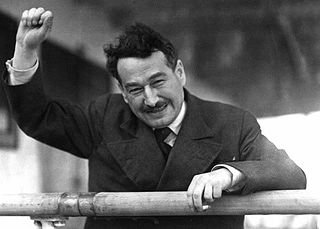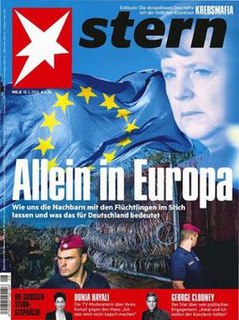
Henri Nannen was a German journalist and wartime Nazi propagandist. He became one of the most prominent journalists and magazine publishers in Germany.

Egon Erwin Kisch was an Austrian and Czechoslovak writer and journalist, who wrote in German. He styled himself Der Rasende Reporter for his countless travels to the far corners of the globe and his equally numerous articles produced in a relatively short time, Kisch was noted for his development of literary reportage, his opposition to Adolf Hitler's Nazi regime, and his Communism.

Stern is a weekly news magazine published in Hamburg, Germany, by Gruner + Jahr, a subsidiary of Bertelsmann.
Walter James Amoss III is former editor of The Times-Picayune. Under his leadership and that of the publisher, Ashton Phelps Jr., the paper won two Pulitzer Prizes in 1997 for public service and editorial cartooning, and in 2006 won two more Pulitzer Prizes for its coverage of Hurricane Katrina.

Gruner + Jahr is a publishing house headquartered in Hamburg, Germany. The company was founded in 1965 by Richard Gruner, John Jahr, and Gerd Bucerius. From 1969 to 1973, Bertelsmann acquired a majority share in the company and gradually increased it over time. Since 2014, the company has been a fully owned subsidiary of the Gütersloh-based media and services group. Under the leadership and innovation strategy of Julia Jäkel, Gruner + Jahr has evolved into a publishing house producing cross-channel media products for the digital society.

Reimar Oltmanns is a well-known journalist and author in Germany.

Ullrich Fichtner is a senior German journalist and editor-in-chief of Der Spiegel magazine.

In late 1934 and early 1935, the United Australia Party Government of Joseph Lyons failed to exclude Egon Erwin Kisch, a member of the Communist Party of Germany, from entering Australia.

Angelika Overath is a German author and journalist.

Petra Reski is a German journalist and author renowned for her anti-Mafia publications.
The Deutsche Journalistenschule e.V., the German School of Journalism, is a journalism school in Germany. At the time of its establishment, it was the country's first German journalism school. Today, Deutsche Journalistenschule is considered one of the best schools for journalism in Germany, along with the Henri-Nannen-Schule in Hamburg.

Emil Benčík is a Slovak writer, journalist and translator. He established the feature radio documentary in Slovakia and created the first family radio series in the country called Čo nového, Bielikovci, which during its 17 years run established itself as one of the most popular programs in Slovakia's history with almost 1 in 2 Slovaks tuning in regularly.
The Henri-Nannen-Schule, formerly Hamburger Journalistenschule, is the journalist school of Europe's largest publishing house, Gruner + Jahr, German weekly Die Zeit and national news magazine Der Spiegel. Its seat is Hamburg and it is considered one of the best schools of journalism in Germany, along with the German School of Journalism in Munich.
Marcel Rosenbach is a German journalist.
Takis Würger is a German investigative journalist, author, war correspondent and staff writer for Der Spiegel, reporting from warzone locales such as Afghanistan, Libya, Ukraine, and throughout the Middle East.

The Bordellos of Algiers is a 1927 German silent drama film directed by Wolfgang Hoffmann-Harnisch and starring Maria Jacobini, Camilla Horn and Warwick Ward. The film was shot on location in North Africa. The film's sets were designed by the art directors Hans Jacoby and Bruno Krauskopf.
The following events occurred in November 1934:
Jonathan Stock is a German journalist and staff writer for Der Spiegel magazine. Stock studied European history at University College London. After graduating, he attended the Henri Nannen School of Journalism. Before joining Der Spiegel in 2012, he contributed as a freelancer for the German television broadcaster ZDF and the weekly newspaper Die Zeit. He covered the Libyan crisis and civil war, the Syrian civil war and the war in Afghanistan. Stock's work has been awarded with several major German prizes in journalism.

Nikolaus Blome is a German journalist and author.

Frederik Obermaier is an investigative journalist for the Munich-based newspaper, Süddeutsche Zeitung, and author. Together with his colleague Bastian Obermayer in 2016 he initiated and coordinated the Panama Papers-revelations.












